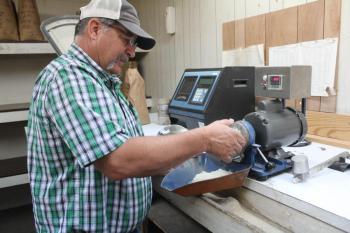
Ville Platte Rice Dryer, Inc. Manager, Felix Morein, is seen checking the grade of rice that was brought into the local rice drying facility to be dried and stored. This process includes running the rice through a machine that removes the hull and then grades the rice. (Gazette photo by Elizabeth West)
Rice rice baby
By: ELIZABETH WEST
Managing Editor
You can take the boy out of the farm, but you can’t always take the farm out of the boy. At least those words ring true when speaking about Ville Platte Rice Dryer, Inc. Manager, Felix Morein.
“At one point in my life farming had me on the ropes financially,” said Morein. “The question was always, could I make it, or could I not make it? I eventually made the decision to get out of the business, and I stayed out for about eight years.”
During that time, Morein, who had farmed rice and raised cattle, worked in a variety of professions including a stint moonlighting at the funeral home, working on the pipelines, doing recovery after hurricane Katrina and working as a truck driver.
Soon though, Morein said, “I was wanting to get back into the agriculture business because it was what I really enjoyed.”
His love for agriculture is something the Evangeline Parish native learned from his father Harold Morein, who was a local rice farmer in the parish before he himself served as the VP Rice Dryer’s manager in the early 1970s.
Morein said, “I was out of agriculture for a few years when I was offered this position at the Rice Dryer, and it was a perfect opportunity for me to get back into the ag. business.
“It’s exciting too because I’m doing some of the things I saw my father do when he was the manager.”
As the manger, of the rice dryer that was incorporated in 1954, for the last two and a half years, Morein has been tasked with being the middle man between the farmer and the market.
“We provide a service to the farmers by drying their rice and storing it until the farmer sells his rice,” said Morein. We also arrange for transportation of the rice.”
Besides drying and storing the crop, they also must check the grade of a farmers rice by removing the hull from a small portion of the crop at the rice dryer.
After drying a farmers load of rice down to 13 percent moisture, it is then placed in the towering concrete and metal silo’s at the dryer located on Southeast Railroad Street.
In the past the rice that filled those silos belonged to the farmers who were members of the co-op that was formed at the VP Rice Dryer in the 1970s by a group of local farmers. During this time, the rice dryer also had a farm supply store that provided supplies to the members.
With the agriculture business changes that have occurred over the years, now the VP Rice Dryer is a place that welcomes rice from any farmer seeking the services they offer.
Morein said, “They use to not really like to store rice for people who were not members of the co-op. Today though, we take whatever we can get, and it’s a lot less volume than we use to store.”
The change in the amount of rice taken in by the rice dryer has decreased over the years according to Morein because many farmers have been able to build their own storing facility on their farm.
“A farmer use to farm a small amount,” said Morein. “The average size farm was a lot smaller back in the old days. So not everyone could afford to have everything they needed, like a place to store their product.”
He then continued, “Most of the land that was being farmed that wasn’t sold to residential, is still being farmed today. Rice fields are still rice fields.
“The difference now is that even though the same amount of land is being farmed, you have fewer farmers. Therefore, a lot of them can afford their own storing facilities now.”
According to data from the LSU Ag Center, there were approximately 90 rice producers in Evangeline Parish in 2014. Of those 90 rice producers in the parish, Morein says that the local rice dryer dries and stores rice for around 20 of those farmers.
A lot of the rice stored, Morein said, “Goes to in-state mills where it can then be processed. Once it is processed, that rice could go anywhere.”
According to Morein, who buys the rice is always changing, which he said, “the government has a lot to do with.”
“Iran and Iraq were our best customers back in the day because they had money,” said Morein. “Obviously, that has changed today. One reason why those countries wanted our rice was because Louisiana and the United States grows higher quality rice then places like Thailand, Vietnam and India.”
Other hurdles that the local rice dryer faces according to Morein, are the cost of doing business and weather.
However, even with these unpredictable hurdles being inevitable, Morein describes his job as a rewarding experience.
Morein said, “Even though I am not out there cultivating the land anymore, I am just glad I am able to be a part of the process. We all need to eat, which makes farmers very valuable. It is rewarding to be a part of providing the farmers who don’t have their own storing facility with a place to go with their crop. Those farmers still need us, and we are happy to be here for them.”
- Log in to post comments

